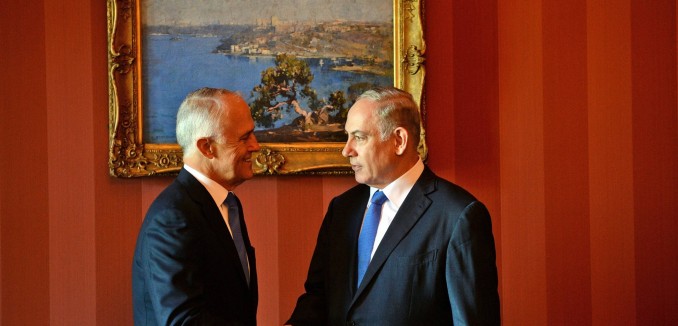Australian Prime Minister Malcolm Turnbull greeted his Israeli counterpart Benjamin Netanyahu in a joint press conference in Sydney on Wednesday by highlighting the two countries’ historic friendship and criticizing the United Nations’ treatment of the Jewish state.
Turnbull noted the support Australia have given Israel over the past century, including fighting in Beersheba during World War I and voting at the UN in 1947 to support Israel’s founding. He highlighted the similarities between the two nations:
We’ve also talked about the remarkable achievement of Israel as truly a miraculous nation; a nation founded on the most ancient history, yet at the cutting edge of technology and innovation, inspiring others. Of course, as you know, we have our landing pad as part of our Innovation and Science Agenda in Israel. We are deepening that cooperation with agreement on technology and innovation, and we are enhancing, too, the people-to-people connections with an air services agreement. We are delighted at the way the working holiday visa arrangements have been operating. So many of our young people are travelling to each other’s countries and getting to know the Australian way of life, the Israeli way of life.
“We have so much in common, shared values, democracy, freedom, the rule of law,” Turnbull summarized. “Two great democracies, one very small in area, one vast, but each of us big-hearted, generous, committed to freedom. Prime Minister, you are so welcome here in Australia.”
Netanyahu, the first sitting Israeli prime minister to visit Australia, also emphasized the two countries’ historic ties and similarities. He noted that both countries shared the threat of “radical forces that seek to take all of humanity back to a dark past.” He added that he sees “a change in the Middle East, in many Arab countries, that recognize that they too are being threatened by these malignant forces. That gives me hope that in cooperating with them for our common security, we might also be able to advance the peace between us and them, and ultimately between us and our Palestinian neighbours. And in all these efforts we see you – Australia – as our partner.”
The Israeli leader told journalists that Israel still hoped for peace with a Palestinian state that recognized a Jewish state. “I don’t want to incorporate two million Palestinians as citizens of Israel,” he said. “Nor do I want them as subjects of Israel. I want them to have all the freedoms to govern themselves, but none of the powers to threaten us. That is the essence of what we’re suggesting. Let them govern themselves but let them not have the military and physical power to threaten the State of Israel which, as you know, is a tiny country.”
Netanyahu’s answer seemed to be consistent with the view of the late Israeli Prime Minister Yitzhak Rabin, who said in his final speech before the Knesset that he would support a Palestinian entity “which will independently run the lives of the Palestinians under its authority.”
Turnbull reiterated his support for “two states where Israelis, the Israeli people, the Palestinian people live side-by-side as a result of direct negotiations between them -that is the fundamental point – and live together in peace and the security that they are entitled to expect. And you can’t expect – being blunt and realistic about this – you cannot expect any Israeli government to put itself in a position where security is at risk, where its’ citizens are not safe.”
Earlier that day, Turnbull wrote an op-ed in The Australian in which he not only hailed the friendship between the two nations, but also criticized the UN for singling out Israel. “My government will not support one-sided resolutions criticizing Israel of the kind recently adopted by the UN Security Council and we deplore the boycott campaigns designed to delegitimize the Jewish state,” he wrote.
[Photo: Benjamin Netanyahu – בנימין נתניהו / Facebook ]




